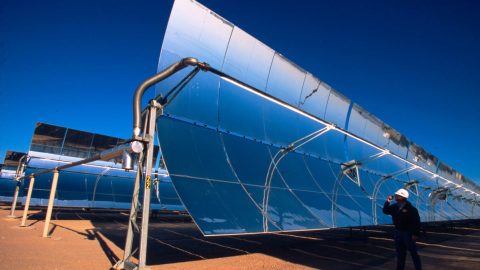There is currently a never-ending news flow about the indescribable human suffering in Ukraine that is complemented by turbulences on the energy markets and negative economic forecasts. The strong degree of dependence on fossil energy carriers like natural gas and crude oil has had devastating effects on various levels. This has also further fuelled the climate and biodiversity crisis, as the World Climate Council has only recently pointed out again. As the Intergovernmental Panel on Climate Change (IPCC) warned in a status report, “Any further delay of concerted, forward-looking, global measures aimed at adjusting and mitigating [the climate crisis] increases the risk of missing a short and closing time window that would allow us to ensure a sustainable future worth living in.”
In this context, it is up to politics, the economy, and society to develop the right answers to the linked causes and effects of these multiple crises. In addition to extending immediate solidarity to those affected by the Russian war of aggression, it is the EU and its member states in particular that have to quickly reduce the dependency on fossil energy carriers. What we need to heed the tenets of climate protection, nature conservation, and energy security is wholistic responses instead of short-sighted pseudo-solutions. The latter would create new dependencies that would be environmentally harmful and geopolitically dubious, much like, for example, the expansion of liquid natural gas supplies from the Arab region or relying on the highly risky technology of nuclear power.
1. Saving energy and using it more efficiently
The reduction of the excessive energy consumption in Europe and Austria has first priority, in combination with an increase in efficiency. To this end, we need a profound rethinking when it comes to the use of fossil fuels: domestic heating, retrofitted insulation, and traffic hold enormous potential that could be realised quickly if the politicians provided the framework. So far, these key areas have seen major shortcomings. Effective countermeasures have been delayed for too long. Companies, too, have to improve their climate strategies and fully tap into the savings potentials in their sphere along their value chain on the basis of scientific criteria. In addition to the political and the corporate realm, every single one of us can contribute to saving energy – this includes the right choice of energy-saving devices, the efficient use of said devices, the adjustment of electricity and heating operations, the (subsidised) insulation of buildings, and the general rethinking of consumer decisions.
2. Relying on energy that was produced from renewable sources and in an environmentally sound way
The recent IPCC report clearly illustrates that climate and environmental protection have to go hand in hand. Therefore, renewable energy has to be consistently expanded along the lines of obligatory criteria of environmental protection. Here, too, the right overall concept and a differentiated approach are key: whereas for example, hydroelectric power is already very well established in Austria, the photovoltaic sector still has a lot of upward potential. At the same time, the tax system has to be reformed with a keen eye on the environment, and fossil subsidies have to abolished.
3. Realign the financial market and reform the Taxonomy
The financial market also plays a crucial role in energy transformation. The question of how we can act sustainably, what projects we finance, and from what dependencies we should liberate ourselves is highly relevant. Here, we do not only need clear legal guidelines, but also climate-friendly and environmentally sound investments to the tune of billions. This makes a scientifically based EU Taxonomy even more important. In contrast to current plans, neither natural gas, which is harmful to the climate, nor the unsafe nuclear power can be declared sustainable. This kind of greenwashing would thwart the achievement of the 1.5-degree target of the Paris (climate) Agreement and delay a real transformation. Also, the Russian aggression in Ukraine is clearly illustrating the potential downside of nuclear power.
Conclusion
In the coming weeks and months, the governments across Europe have to take the kind of fundamental decisions towards an environmentally sound energy transformation that have been delayed for far too long. Instead of repeating mistakes of the past, a climate- and environmentally friendly route has to be taken. Companies and their stakeholders are also called upon to review their climate strategies, reconfigure their strategic cornerstones, accelerate the implementation and adjust their communication. The goal here is an effective, scientifically based climate strategy with a sustainable financial market that drives it.
Legal note:
Prognoses are no reliable indicator for future performance.
Legal disclaimer
This document is an advertisement. Unless indicated otherwise, source: Erste Asset Management GmbH. The language of communication of the sales offices is German and the languages of communication of the Management Company also include English.
The prospectus for UCITS funds (including any amendments) is prepared and published in accordance with the provisions of the InvFG 2011 as amended. Information for Investors pursuant to § 21 AIFMG is prepared for the alternative investment funds (AIF) administered by Erste Asset Management GmbH pursuant to the provisions of the AIFMG in conjunction with the InvFG 2011.
The currently valid versions of the prospectus, the Information for Investors pursuant to § 21 AIFMG, and the key information document can be found on the website www.erste-am.com under “Mandatory publications” and can be obtained free of charge by interested investors at the offices of the Management Company and at the offices of the depositary bank. The exact date of the most recent publication of the prospectus, the languages in which the fund prospectus or the Information for Investors pursuant to Art 21 AIFMG and the key information document are available, and any other locations where the documents can be obtained are indicated on the website www.erste-am.com. A summary of the investor rights is available in German and English on the website www.erste-am.com/investor-rights and can also be obtained from the Management Company.
The Management Company can decide to suspend the provisions it has taken for the sale of unit certificates in other countries in accordance with the regulatory requirements.
Note: You are about to purchase a product that may be difficult to understand. We recommend that you read the indicated fund documents before making an investment decision. In addition to the locations listed above, you can obtain these documents free of charge at the offices of the referring Sparkassen bank and the offices of Erste Bank der oesterreichischen Sparkassen AG. You can also access these documents electronically at www.erste-am.com.
Our analyses and conclusions are general in nature and do not take into account the individual characteristics of our investors in terms of earnings, taxation, experience and knowledge, investment objective, financial position, capacity for loss, and risk tolerance. Past performance is not a reliable indicator of the future performance of a fund.
Please note: Investments in securities entail risks in addition to the opportunities presented here. The value of units and their earnings can rise and fall. Changes in exchange rates can also have a positive or negative effect on the value of an investment. For this reason, you may receive less than your originally invested amount when you redeem your units. Persons who are interested in purchasing units in investment funds are advised to read the current fund prospectus(es) and the Information for Investors pursuant to § 21 AIFMG, especially the risk notices they contain, before making an investment decision. If the fund currency is different than the investor’s home currency, changes in the relevant exchange rate can positively or negatively influence the value of the investment and the amount of the costs associated with the fund in the home currency.
We are not permitted to directly or indirectly offer, sell, transfer, or deliver this financial product to natural or legal persons whose place of residence or domicile is located in a country where this is legally prohibited. In this case, we may not provide any product information, either.
Please consult the corresponding information in the fund prospectus and the Information for Investors pursuant to § 21 AIFMG for restrictions on the sale of the fund to American or Russian citizens.
It is expressly noted that this communication does not provide any investment recommendations, but only expresses our current market assessment. Thus, this communication is not a substitute for investment advice.
This document does not represent a sales activity of the Management Company and therefore may not be construed as an offer for the purchase or sale of financial or investment instruments.
Erste Asset Management GmbH is affiliated with the Erste Bank and austrian Sparkassen banks.
Please also read the “Information about us and our securities services” published by your bank.


